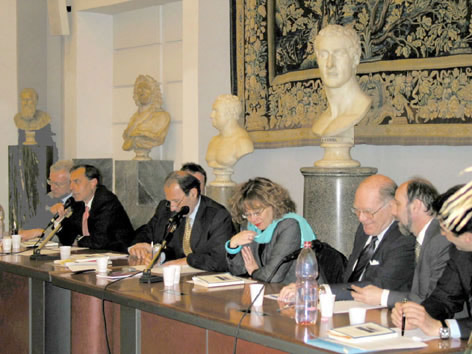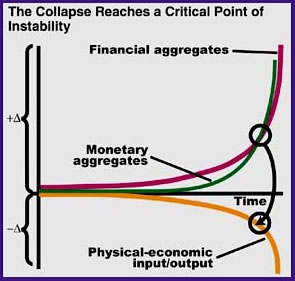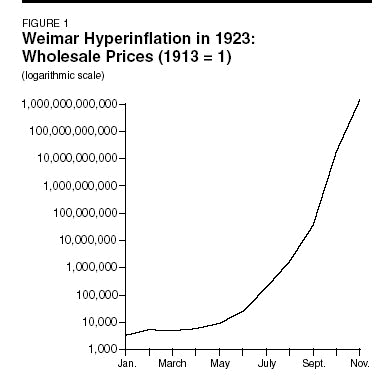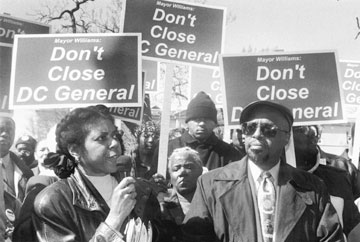LaRouche in Italy: Politics
Must Now Submit to Morality
September 2007
Lyndon LaRouche concluded a visit to Italy September 18-20, where he addressed Italian political leaders about his proposal to build a "firewall" to protect the population and the banking system from the financial conflagration overtaking the hedge funds. On the last evening, he addressed about 20 members of the Christian Democratic Party, along with the Mayor and members of the City Council in the town of Segni, not far from Rome. The conference was organized by Mr. LaRouche's friend and collaborator, economist Nino Galloni, who introduced the American stateman to the group. Here is a transcript of his speech and the discussion that followed. Subheads have been added.

Rome, Italy - Lyndon H. LaRouche, Jr. (3rd from right) in the Senate chamber, April 8, 2003, in a meeting organized by Senator Oskar Peterlini and Patrizia Toia. Economist Dr. Nino Galloni 5th from right) with his new book Dopo lo sviluppo sostenibile: l'ambiente come obiettivo, la crescita come vincolo. (Beyond Sustainable Development: Environment as Target, Growth as Constraint). Mr. LaRouche told the Senators and Deputies present that the best way to fight the disastrous policies of Dick Cheney and George W. Bush would be to work for a change in the economic policy of Europe, from the standpoint of the Eurasian Land-Bridge.
On the 25th of July of this year, I delivered a webcast, broadcast internationally, on the subject of the presently ongoing, terminal collapse of the present world monetary-financial system. This crash is the product of degeneration, at least in terms of generations; there were mistakes made following the death of President Franklin Roosevelt in the United States, which led, about 20 years later, to the increasing power of the British financial system, the Anglo-Dutch financial system—not the British people—but the Anglo-Dutch financial system, the banking system. This resulted in certain changes in custom, in international institutions and in the United States. In 1971-1972, there was a change in the international monetary system, from a regulated system of parity among currencies, to a predatory system, in which certain financial interests internationally, began to loot whole countries, and started a crisis, which we know of as the crisis in South and Central America, for example.
During the period 1977 through 1981, under the Carter Administration, the United States destroyed the entire system which had been built up by Franklin Roosevelt. Since that time, there has been a degeneration of the economy of Europe, and of the United States, and this was associated with the running to international markets for cheap labor, and destroying the production in agriculture and industry in Europe, as well as in the Americas. This led into the October 1987 crisis in the financial system in the United States.
The 'White-Collar' De-Generation
The reaction to that crisis in 1987 has been the destruction of the world economy, today. These processes take some time to unfold, usually. I'm 85 years of age, and to me, these things are very familiar things, from my experience. Thus, to younger generations—and my generation is dying out; when I look at people who attended secondary school with me, they're mostly dead; I can't find more than one or two left, that attended the school system in my youth, who are still alive. The younger generation, which was born after 1945, has really no experience with society as it existed, say, from 1920 on—they don't know anything about it from experience. This is complicated by the fact that the so-called "white-collar generation" that was born between 1945 and 1958, that generation which is also known as the "68ers" in the European experience, as well as U.S. experience: This generation has lost a quality which all earlier generations I know of, in the United States, had. That is, the United States was born of a generation that began migrating into North America, during the first half of the 17th Century; and some of my ancestors were part of that migration, both by way of Canada, indirectly into what became the United States, and directly into the English colonies.
This was associated with a great moral degeneration in the population of Europe and of the United States. Because, the Baby-Boomer generation, which is really sophistical, lost the sense of older generations: of thinking of one's own life in terms of the conditions of the life you produce for your children and grandchildren. For example, immigrants into the United States in the late-19th Century or 20th Century, came from Europe, often, fleeing from poverty in Europe. They would come into the United States, and they would work hard at low wages, often. But they would think about the future they were building for their children and grandchildren. Let's say, someone from Italy would come to the United States as a laborer, and their grandchildren would be physicians and scientists. And there was a corresponding respect for ancestors. As in Italy, the beautiful cultures that are preserved because they are objects of a memory of a people.
And the essential thing is, of course, the practical sense of immortality, human immortality. The animal lives and dies. But man is not an animal. Man's body is that of an animal, but the power of ideas, the power of discovery, the power of devotion to coming generations, is something which is peculiar to human beings. A generation which has lost that sense of connection, lacks morality! As in the I Corinthians 13 of Paul: Without this passion which Paul refers to as agape, the quality of humanity is not realized, the sense of immortality of the human individual personality is not realized. And the motives are not that.
So therefore, you get an egotistical form of society, which thinks about "my immediate pleasure within my lifetime, of my circle of friends, in my lifetime." There's no sense of mission, or purpose in life. There is really no morality in it—a certain kind of practical code of behavior, but no morality. And therefore, you have, in Europe, as this generation, sometimes called the 68ers, became more and more influential, the concern for the future of humanity disappeared. And the achievements of rebuilding in the post-war period, as in Europe, were lost! Agriculture was destroyed; industry was destroyed; scientific studies were destroyed. All the kinds of motives and skills which people acquire, in order to contribute something to humanity—this was put to one side. And a shrinking part of the total population, particularly of the Baby-Boomer generation, the 68er generation, organized society, as they gained more power, for their peculiar pleasures and appetites. As a part of this, production was abandoned, agriculture was destroyed more and more, industry was destroyed; basic economic infrastructure, power systems, sewage systems, all the things we need, were destroyed.

What happened especially from about 1971-72, is that you had a great increase in the amount of money in circulation. You could measure this per square kilometer, you could measure this per capita: What you had is, the physical production, the physical productivity of society collapses per capita and per square kilometer, while the money in circulation, the nominal financial assets, went skyrocketing. And the destiny of the lower 80% of the income brackets of the population, sank. Since you had a generation which was interested only in its monetary wealth, not the real wealth of society, the generation which no longer had a recognition of its own soul, but only its own pleasure, the point came, that the curve going up, of debt and finance, and the curve going down, of real production, and real satisfaction of real human needs [went off the charts] (see Figure 1). And it became more and more difficult to resist these trends.
A Critical Point Has Been Reached
Now, what happened this past July, was that a critical point was reached in the long historical process; the present world monetary system went into a final collapse phase: This system will not live much longer. The crisis on the markets is only the beginning of worse to come. The best model for the situation is what happened to Germany in 1923. Because of the policy of the Versailles Allies, in punishing Germany in the 1920s, Germany was saddled with a great artificial debt imposed upon it by the Versailles organization. And the Germans then had to pay this, but also, the German factories were in large part shut down. So, the ability of Germany to pay debt collapsed, under the Versailles conditions. The debt, however, increased—without relief. The German government printed money; they kept printing money. In 1923, by June of 1923, the German system under the Weimar Republic was finished. And people still had money in June. But by October, the beginning of November, the money was worthless (see Figure 2).

The world, has, since the Summer, since July, when I first warned that this decisive development was in process, that is exactly the pattern that's happened with debt, and credit and money, in the recent months. In such systems, because of the voluntary characteristic of the human will, you can never precisely predict mechanically, how something is going work out: You can not draw statistical projections. What you can do, is you find boundary conditions you're approaching. When you're moving toward a boundary, sooner or later you will hit that boundary, or that boundary will hit you. I would say, it's unsafe to assume that this system would last through December. It might last longer; it might collapse quicker. That I can not forecast. But I can forecast, assuming that this could last beyond December, were crazy.
We have a window of opportunity between increasing pain and disaster, where we can still make decisions which would stop this process. So, I've taken a decision on this issue. This doesn't explain everything I intend to do, but it does explain some aspect of it. Because a lot of this debt increase was done by mortgages in the case of Italy—same kind of thing. Largely the financial expansion in the United States, during the past 15 years and more, has been based on use of mortgages as a lever in a rising price of mortgages for supporting the financial system in speculation.
So, as a result of that, you've had a great inflation in mortgages. The price of houses—very poor quality houses—has soared! The mortgages created for the banking system, by this system, have been used to expand credit, greatly! The credit went into the hands of people outside the banking system, such as hedge funds. There is not a single bank in Western or Central Europe, or the United States, which is not insolvent. The cash, the credit, is in the hands of these international hedge funds. Now, we have the mortgage prices collapsing. And the collapse—we're talking about thousands of mortgages collapsing, foreclosures. This is already a serious social disaster in the United States. It's also in England; it's also in Spain; it's also in most countries in Europe. So, at the present rate, we're looking at a potential social disaster, in terms of home mortgages being foreclosed on.
We're also faced with the regular banks, that is the banks which are private banks, but chartered by the national government, or banks of states of the United States, which are chartered by the states; regular banks, where people save money, where mortgages used to be loaned and that sort of thing: These kinds of institutions no longer have power.
So, under the present situation, what we're going to have is a social disaster, in which both mass evictions of citizens, on a large scale, and also the collapse of the banks on which they depend, is what is being threatened.
Now, since I have association with some leading people in finance, as well as in politics in the United States, before making my proposal as to what we should do, I talked to them. What I propose is entirely my own responsibility. But I did not put it out until I had their agreement and recognition that this was the right thing to do. So, what I did, is—it's now a proposed law before the Congress of the United States: Under this law, the Federal government would enact a Federal law to prevent the foreclosures on mortgages. Nobody is evicted. They will pay a negotiated amount each month, instead of a mortgage fee, to the relevant bank. And only the regular banks will get this benefit. Because, as you know, we must protect the local bank on which the community depends. The ordinary business of the community, hmm? Therefore, we said, "we protect the banks in the states, as in the national community; we protect the homeowners. The speculators will have to suffer." Because, we must defend the social institutions of society.
If we do that, there are measures, further measures we can take, which can assure the stability of society, and also an economic recovery. It will be a time of rebuilding. It will not be a period of sudden wealth, but it will be a good time, for those who still think in the old ways.
The Benefit of the Other

Treaty of Wesphalia
by Gerard Terborch
The other side of this, which is the social side, is that, if you try to run politics on the basis of desperation, you will get an animal, not a human being. You must appeal to the principle of agape. In modern European civilization, we have two crucial examples of the role of agape in making policy for civilization. One, the Peace of Westphalia; the existence of the modern nation-state in a civilized form depends upon the Treaty of Westphalia. The principle of the "benefit of the other": Agape. And the U.S. Constitution is based on the same principle. You have it as the law defined by Gottfried Leibniz, which he spelled out in his second rebuttal of the British system, which again, was called the commitment of the dynamics, of humanity, of the "pursuit of happiness" of the individual, meaning happiness in the theological sense. Which is also the fundamental principle of the Constitution of the United States, in the Preamble. So, the law that I'm proposing is based on the Preamble of the Constitution. Which is the same principle that Franklin Roosevelt as President used to organize the recovery in the United States.
The organizing politically on behalf of the legislation which I indicated to you—the obvious thing to me, and to others with whom I had consulted, is that you would not get the initiative for such a law coming from the Congress of the United States as such: It would come from the people who live in the states, as citizens of the Federal states. Because their immediate representation is in the local state government. They live in those states, they pay taxes in those states, they look to local government to help them be secure. The local politicians, like the state legislators, are much closer to the people than the members of the U.S. Congress. And the best way is to have the people and the politicians from the states, light fires under the rear ends of the politicians in Washington.
But the important thing is not the people taking vengeance, shall we say, on the politicians; the principle is agape. Because the principle of agape is not just an obligation. The principle of agape is much more positive than a simple negation of something. It's an act of love of humanity. And when you appeal to the principle of agape in a practical way, but with a devotion to that intention, you bring out the best in the people. Whereas if you appeal to greed or something else, you bring out the worst in them.
The principle of leadership in society, of true leadership, is love of mankind. Without that, there is no good politics. To do good, is the morality. To sacrifice oneself, if necessary, to do good, is good for humanity.
So, I can say: We are at a crisis point. If we are greedy and stupid, then we are facing the worst crisis in modern human history. If we can mobilize to act for love of mankind, we get the opposite result. So, politics must now submit to morality. That's the test. Can we pass that test?
Thank you.
Dialogue With LaRouche
Q: I thank you for your contribution.

LaRouche representative Lynne Speed (left) exposed the corruption of National Century Financial Enterprises and Doctors Community Healthcare Corporation, at a May 8, 2001 press conference in Washington D.C. She is joined here with PA State Representative Harold James.
I have two questions for you: Hillary Clinton has a new proposal for health insurance in the United States, since there is a U.S. population of 40-50 million without insurance. People who get sick, have to die. With the growing aging population, they must be involved in activities that keep their minds active, and physically active. So, if we don't deal with this problem, it's going to be impossible to manage a public health-system for senior citizens. So that's my first question.
The second question: I'm very interested in recent magazines of EIR on the question of banks, in which it's discussed that the government has to help the banks, for necessary social requirements for development. But what is the action of hedge funds that is so problematic? Because most institutions both right and left have close links to those hedge funds.
LaRouche: Well, on the second question, which is easier, the problem is, the hedge funds represent something which should not be allowed in law! The hedge fund was established, with the help of the United States, by the British, as a British system, in the 1970s. When I was running for President, for the Democratic nomination for President in 1979, for the 1980 nomination, the big problem we had, was that the Trilateral Commission, which controlled the Carter Administration, had legalized usury! They destroyed the protection of agriculture, destroyed the system of protection of industry, destroyed fair trade, and legalized usury! And we stopped investing in developing agriculture and industry, at least our system of agriculture and industry.
The example is, if you study the United States infrastructure—that is, the public side of infrastructure, power systems, water systems, bridges, highways, railways and so forth—you find that there's been a net shrinking of infrastructure per capita and per square kilometer in the United States since 1967! Most infrastructure, such as railways, bridges, and power stations, and so forth, are designed to have to be refinanced within 30 years, 25-30 years. Therefore, in society, you have to have the basis of maintaining your infrastructure based on at least a 25-year cycle: that is, you must think about replenishing 25% of your infrastructure, constantly.
All right, the reason I put the second question first, is because the first question is also a simple answer: In the Second World War, at the time when I was in military service, we had 17 million people in military service from the United States. We had developed a system of health care in the military to service that population. It was a very good system. There were mistakes made, as there always are mistakes made.
At the end of the war, we had the intelligence to realize that this experience in warfare, of military medicine, could be applied to the whole population of the United States. So, we had a law adopted then, called Hill-Burton, which covered essentially the Federal assistance to states and localities in having adequate, full-service hospital care in every community. And together with the veterans hospital system, we would have also the public-health system. In order to have sufficient, qualified physicians, we would train people and subsidize the training of medical professional personnel, in order to have a sufficient supply of that personnel, for national needs, as for emergencies, for example. So, for example, a physician was subsidized in receiving medical education and training. Then they were expected to be willing to put in a certain amount of service, to assist in public health care.
Under Nixon we destroyed the system. And you will find, where there used to be hospitals, fine hospitals, fine institutions, they don't exist today! And the changes are stupid! I mean, they're not only wrong, they're stupid. As some of you may know, who have medical experience, the best institution to have, is a general clinic, like a general hospital, where a patient goes in with a complaint, and you have various specialties of functioning in that hospital, where the whole clinic is treating the patient. Each patient—they go to one doctor, if that's not the problem; they go to another office. Then the patient, through the patient's selection of physician, has access to this permanent care.
For example, if you're a public institution, and you are maintaining a medical facility, what do you want? You want a hospital clinic which can take care of the whole community. Instead of treating the disease, you treat the patient.
Where Hillary Clinton made a big mistake with her health-care plan, was she was trying to adapt to a system that was no good. What you need are scientifically powerful medical institutions, where a patient can walk in, just as a human being, especially from their own community, and they walk out of that institution, having their problems of life diagnosed: You diagnose the life of the patient, the condition of the patient, the condition of the community. And you have all the people there with the various skills, who together, in consultation, can bring that to bear as necessary. Who can use the wisdom and experience of that community to know what the problems are in that community: What to look for, what to expect, what kind of diseases do we have here?
Just the same way you need schools that do the same things for students. Each student may have a different need. But you have a community, which can say, "Well, we have an institution that covers all these different kinds of needs."
So that the best system, is a system of recognizing that the common needs of a people, are best handled by a public community service.
So, that's, I think, the answer. It's an attitude: What's our attitude about human beings? On the one hand, we want to give the greatest possible freedom to the individual to make a contribution, according to their own will. At the same time, we must take care, collectively, of the needs of all of the community. Whether we do it privately, or publicly, really, is not that different.
The first modern hospital was developed in the end of the medieval period, the beginning of the modern civilization in France. Helga and I visited that place once, it's now a museum. It was actually a part of the Renaissance, part of the 15th-Century Renaissance.
But so, it doesn't make any difference whether it's public or private, but you have to have it. But the recognition of public responsibility is what's important.
The Purpose in Society Is To Do Good
Q: I wanted to reflect on something you said. You touched on the question of the New Deal. Essentially, Roosevelt established a system of correcting distortions in the economic world, a new economic model that succeeded in returning a certain amount of stability to economics. However, there's another aspect which I was struck by, and that's the question of morality, which is now lacking. Which was lost when a model was created which was centered on the question of consumption, also. This lack of morality: Does this lack of morality go back to a model of production, or where consumption is now going into a crisis, and also environmental consumption, and also the problems we've seen in the Third World? So, maybe we should redefine a new model of consumption, a new model of relationship with the environment, to reconstruct a new way of living together socially. Because my impression is, that certain aspects of John Stuart Mill spoke of educating and favoring not only consumption of material goods but also of immaterial goods. So probably the great limit of our society today is that we stopped with the consumption of material goods, so we created a very distorted model which we have to intervene into, and change this model of consumption. Thank you.
 |
 |
Abraham Lincoln |
Franklin D. Roosevelt signs Housing Act |
LaRouche: Well, there was actually no change in Roosevelt's policy from the founding policy of the United States. The problem was, that repeatedly, we had a number of Presidents and others, who were traitors to the United States. All of these Presidents were British agents. For example: Andrew Jackson was such an agent; his successor as President was such an agent. We still have, today, a great struggle with the British system, against the British system.
That's the problem. Two Presidents who favored the British—Coolidge and Hoover—brought the United States down, and Roosevelt was able to return the United States to its Constitutional principles. The evils of which you speak, are a result of what's called, today, British Liberalism, which is essentially a hedonistic system. It's a creation of an infamous character called Paolo Sarpi, who created the system of Liberalism. The system of Liberalism is greed, and no morality.
The American conception, which was against this aspect of the British system, or the Anglo-Dutch Liberal system, was the commitment that the purpose in society, is to do good. It's the principle that you must function on truth, not on Liberalism, and the purpose of life is to do good, which is the principle of the Constitution, the Preamble: the principle of the commitment to do good. The obligation, the sense of obligation to do good. It's like the Good Samaritan conception: Do the good, where the need is there. You're there, the need is there: Do good.
That is very profitable, really, in the long run. Not in the sense of getting riches, but in the sense of creating a better future for coming generations, than any other policy. The greatest policy is love of humanity.
The Role of the British
Q: Brief question. I'm very curious about this question of Great Britain, which you say has had an important role in the United States. In light of the United States, it certainly did have a role 200 or 300 years ago. So, I was very interested and curious, because we all thought, at least nowadays, we all thought it was the United States which sets the course and makes the policy towards Great Britain. For example, the war in Iraq. There was a close—
Galloni: But the U.S. population doesn't want the war in Iraq!
Q: So, who wanted it first—Blair, or not Blair? So, I'm very curious.
Galloni: We're talking about principles in the culture. When you talk about principles, the principles of Liberalism, and then there's the principle of responsibility, Christian social responsibility. Our friend here, we talked about social commitment, that's the meaning of being in politics. We could be in the Communist Party, or whatever, but that's the idea of being in politics, the purpose.
Today this has changed, because culture has changed. It's worsened.
Q: Before you answer, Professor [LaRouche], I was interested by this, especially the banking part. I agree with what you presented on that. The only thing which sort of worried me: I was in the university in 1968, but the interpretation the professor gave about this generation, is, if this generation were the social—more than the political, but the social component which somehow destroyed, in a certain sense destroyed good manners, or good ethics, that is, thinking about the future. So, I want to give a few examples: I think '68 was a break with what was going on, not proposals, but a break, at least that's the way we saw it in Italy, a break. You know, a character couldn't go out with the child of a worker, or girls who went outside, their mothers told them to go with "good families." So there was social discrimination.
If we go even deeper, up to then, 1968, the rights of workers—the unions were not trusted to protect the workers. The problem is I might have only seen my father every 32 hours. I didn't see him much at all, because he had no rights. So, the 1968 movement was seen as liberation.
Now, what happened in San Francisco or other places, this phenomenon was seen as "spoiled brats," just having fun, I really understand this. [This was followed by more back and forth between the questioner and Galloni.]
LaRouche: Let me just finish up on that question, because the 68er generation was not a biological generation. What it was, was that at the end of the war, World War II, there was a policy by certain people in Britain and in the United States, to have a certain conditioning of the so-called white-collar class, born between 1945 and 1958. You could call these "the children of Paolo Sarpi," because he was the one who brought in Ockhamite Liberalism as a policy for his faction of the Venetians. You have the so-called Frankfurt School of existentialism, of Heidegger, or Arendt, and so forth. They destroyed culture, systemically, and they used the training of the children in their possession to do it!
So, that was the problem. This is why the immorality is there: If you believe in Liberalism—and Liberalism is not being nice; Liberalism is denying the existence of morality; denying scientific truth or any other truth, the substitution of consensus for truth.
On the case of the United States, the United States was actually founded from the early part of the 17th Century under the influence of, guess who? Cardinal Nicholas of Cusa, who was already dead then. It was Cusa, who was the author of the design of the modern nation-state, and also of physical science, modern physical science; who was responsible for the policy in response to the Fall of Constantinople, the policy of going out from Europe to other parts of the world, to find other peoples, and to build nations, or build communities, which would be the alternative to what was happening in Europe with this crisis.
The founding of the United States occurred, biologically, essentially in the 17th Century. The people who left Europe for North America, did not leave, in fleeing away from Europe. It was recognized that in order to save humanity, you had to get free of the oligarchical tendencies which were controlling Europe. So the people who went to North America, for example, went, carrying the best traditions of Europe, but free of the oligarchical tradition.
The British Empire was actually founded at the Peace of Paris in February 1763. This resulted in a split in the English colonists in what became the United States. So, you had the force of the American Revolution, as typified by Benjamin Franklin. You had a faction inside what became the United States, which was tied to the British East India Company. The faction of Paolo Sarpi's descendants, including William of Orange.
So, always in the United States, to the present day, we have a faction in the United States which is tied to London, which is generally associated with Wall Street finance. So, what you really have, is you have a split in the English-speaking population, of leading layers, those who represented the patriotic tradition of the United States, as opposed to those who continued to represent part of the extended British policy, that is the British aristocratic policy.
In 1971-72, with the breakup of the Bretton Woods system, the British got control again. It is London and Amsterdam that control the international financial system today. Look at the Maastricht Treaty, and the new Treaty of Amsterdam—
Q: What do you think about the ECB [European Central Bank]?
LaRouche: Totally British. Take the case in Italy, of the Britannia yacht! The Bank of Italy is controlled by the British, through the takeover on the British yacht, the Britannia.
Galloni: Bene! [applause] I think Lyndon gave us a very interesting cross-section of his ideas....
Related pages:
Nino Galloni Speaks at the Schiller Institute Landbridge Conference, September 2007: The Sicily-Tunisia Tunnel and the Extension of the Eurasian Land-Bridge into Africa
Italian Deputies and Senators Hear LaRouche's Proposals on Reorganizing Banking System
LaRouche in Italy: Political Forum with Mr. Gianni and Mr. Tremonti
LaRouche in Rome: Revives Fight for New Bretton Woods
LaRouche’s New Bretton Woods Discussed in Italian Parliament
LaRouche in Italy Outlines Exit Strategy From War (EIR, April 15, 2003)
Schiller Institute Landbridge Conference in Kiedrich, Germany, September 2007
Lyndon LaRouche's Speech to the Landbridge Conference
Helga Zepp-LaRouche's New Call for a New Bretton Woods
